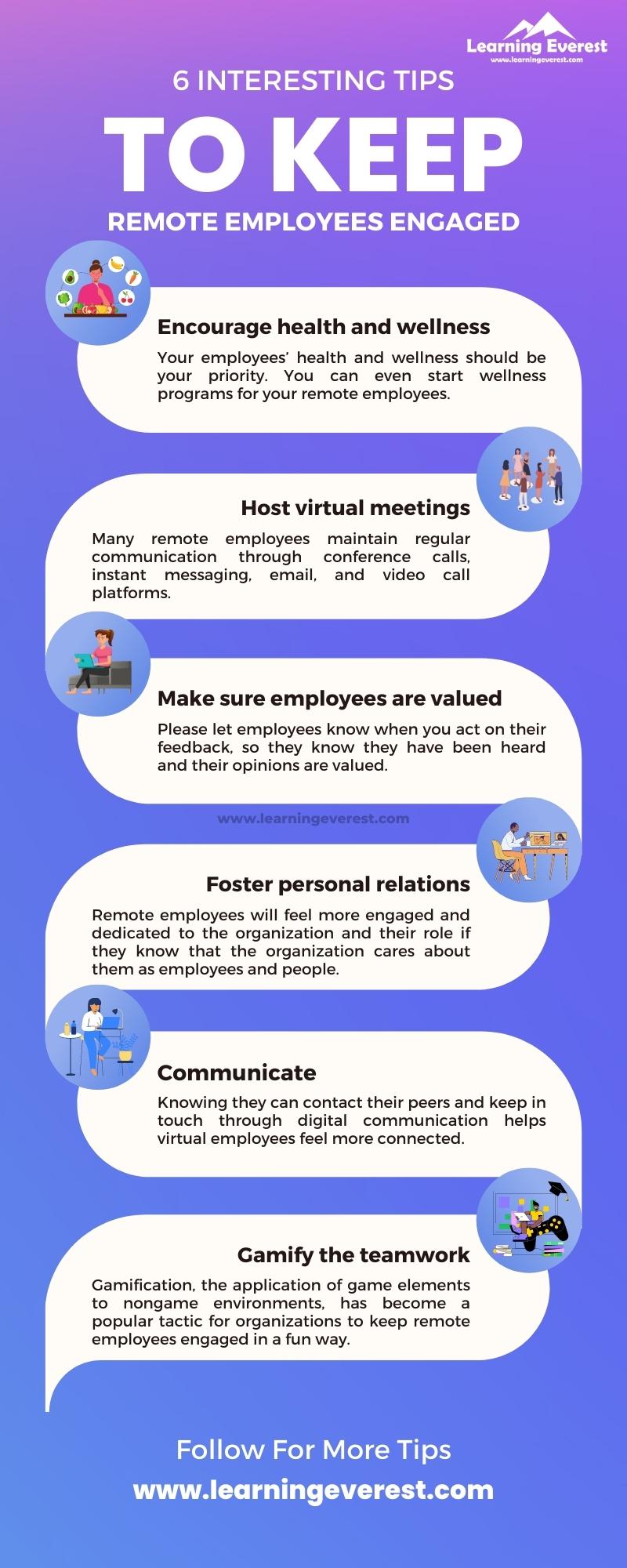There are numerous ways to keep remote employees engaged. In this article, we will cover some ways to maintain your organizational culture and keep remote employees engaged.
Here are 6 Guidelines to Keep Remote Employees Engaged
1. Encourage employee health and wellness
Your employees’ health and wellness should be your priority. If your employees get sick, they will not be able to function at their highest level. Perhaps you can incentivize the team to get outside, have a decent meal, exercise, or create some healthy habits. You can even start wellness programs for your remote employees. This will not only support your employees’ good health but also bring them closer and prove to them that the organization cares about their overall health and well-being. However, it is important to note that it is not only a lack of physical wellness that can impact an employee’s work life.
Mental health issues can often translate to performance loss, productivity, and eventual disengagement. But, most often, workplace budgets for employee well-being concentrate on only providing basic aspects like health insurance. To build a culture that truly empowers employees to lead a life of optimal health and well-being, leaders should focus on certain workplace aspects, such as beginning conversations about mental health. It can be as simple as holding seminars on emotional well-being or providing counsellors to talk to.
2. Host virtual meetings
Many remote employees maintain regular communication through conference calls, instant messaging, email, and video call platforms. When the whole team is performing their jobs, a voice or video conferencing call can encourage teamwork. You can use communication and collaboration tools. Plan for work outings or casual video conferencing to keep remote employees engaged and thrilled to be part of the organization.
3. Make sure employees are valued
Your remote employees also deserve to feel valued – even from a distance. Since you are not in the workplace with them every day to give them a thank-you or take them out to eat for their work anniversary, you should find other ways to praise your remote employees as often as possible. Moreover, make sure your (virtual) door is always open. Miscommunications are common among remote employees, and the last thing you want is for the employees to feel like they cannot talk to you, ask questions, or provide feedback.
Make it clear that you are available for feedback and one-on-one meetings, and really listen and act when an employee confides in you. Also, communicate with employees when you act on their feedback, so they know that they have been heard and their opinions are valued. When employees feel valued, they are more engaged at work. And do not shy away from providing constructive feedback. Help employees take advantage of development opportunities to keep remote employees engaged.
4. Foster personal relations
While you want to be professional with the team, remember that your employees are still human. They have loved ones and bad days like everyone else. As a manager, you need to recognize your employees’ strengths, weaknesses, and interests to better connect with them. Remote employees will feel more engaged and dedicated to the organization and their role if they know that the organization cares about them not only as employees but as people. Communicating with remote employees about their individual experiences in a personalized way keeps remote employees engaged. Above all, organizations must remember that honesty is the key to developing strong remote employee engagement, in or out of the office.
5. Keep the lines of communication open
Remote employees sometimes feel that their team is not around when they are, and vice versa. Knowing that they can contact their peers and keep in touch through digital communication helps virtual employees feel more connected. A well-planned communication strategy is a powerful tool for keeping workflows as smooth and seamless as possible. It promotes greater transparency, which helps remove any distractions from a team member’s path to doing their job. You need a mix of tools for groups and teams, one-on-one collaboration, and organization-wide collaboration. Meanwhile, you must guarantee that these technologies improve the quality of remote work while also not being too complex to use.
6. Gamify the teamwork
Gamification, the application of game elements to nongame environments, has become a popular tactic for organizations to keep remote employees engaged in a fun way. The same tactics of encouraging competition and rewards for everyday activities can be an effective remote employee engagement strategy. Team-based targets and contests can build a sense of collaboration and teamwork. Teams can be based on roles or location, with the key objective being inclusion in striving toward a common objective. Game-based performance can help standardize performance metrics and evaluation standards. This is especially crucial for remote employees, who might feel like they are missing out on major promotion opportunities by not being physically present.
These abovementioned strategies can effectively help you to keep your remote employees engaged. But have you used any other techniques to keep remote employees engaged? Are any not listed here? Let us know.
Infographic
Knowledge Check!
Frequently Asked Questions (FAQs)
Why is employee engagement important?
Employee engagement is the primary ingredient of creative, collaborative organizational cultures. Employees who are engaged experience better well-being and find work more rewarding.
How do we make sure that the employees are valued?
Miscommunications are common among remote employees, and the last thing you want is for the employees to feel like they cannot talk to you, ask questions, or provide feedback.
What is gamification, and why is it popular?
Gamification is the application of game elements to nongame environments. It has become a popular tactic for organizations to keep remote employees engaged in a fun way.






